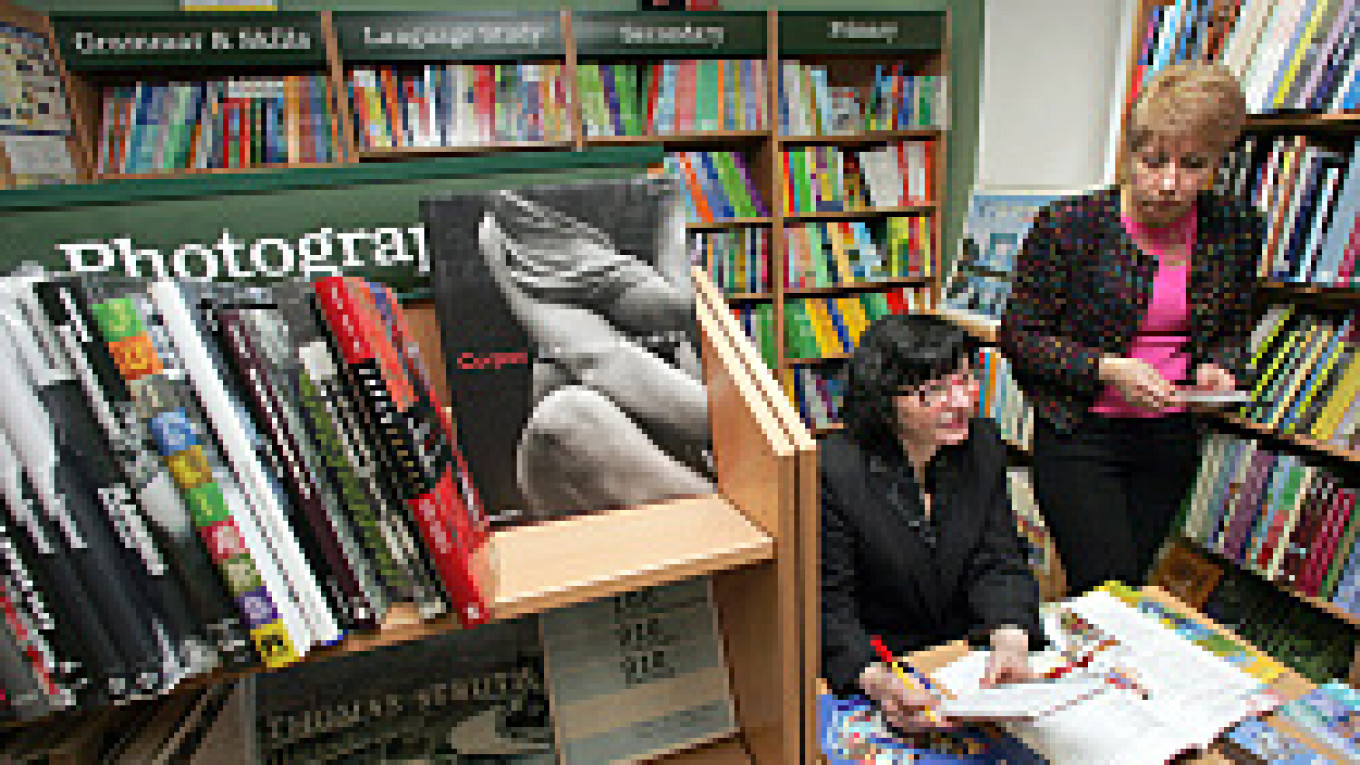The selection is heavy on classics, such as the works of Charles Dickens and Jane Austen, and on popular fiction, including thrillers and chick-lit, but Moscow residents can also find contemporary literature, travel guides and books on Russian history and society.
Most of the English-language books in Moscow are imported from publishers abroad. Lev Voitov of the Anglia bookshop said that on average it took two weeks for a shipment to make its journey by truck from the warehouse outside London. "It depends on the weather and floods in Europe," he said.
There are a few stores in the city center that specialize in foreign-language books. Dom Inostrannoi Knigi, or House of Foreign Books, has dim, wood-paneled interiors, creating an atmosphere that invites customers to browse its collection, which ranges from travel guides to art books to Harry Potter. Most of the merchandise is in English, though it also has cases of books in German, French and Italian.
Anglia is the most expat-oriented, offering a wealth of classic and contemporary literary staples along with a case of children's books and test-prep guides for older students. Anglia has an impressively large selection of travel guides, which Voitov said the store planned to restock ahead of the summer vacations.
The John Parsons Bookshop, next- door to the Higher School of Economics, is tiny but packed with a selection ranging from literature to illustrated volumes on architecture. The bookstore serves the Russian academic community with its specially imported textbooks, but it also sees many foreign customers on weekends.
"On Saturdays, many foreigners come to buy books on Russian history," said the cashier, who declined to give her name. "They live in this country, and they want to know more about its history."
The offerings in Moscow's biggest bookstores are targeted at those studying English, though they have a small supply of popular fiction, history books and Russian novels in translation. Dom Knigi's upper floor has classics next to the books for language-learners and more contemporary books in the section for recent releases. Moskva and Bukberi have similar albeit smaller collections.
With paperbacks stacked vertically on the shelves, the sprawling Biblio-Globus is like a sterile textbook store. The majority of Biblio-Globus' English books are educational materials, although third-year university student Ksenia Smirnova was scrutinizing the fiction. "I would like a book I will read and read again," she said.
Smirnova said she often shopped at Biblio-Globus, "though it's a little bit expensive."
The prices at Biblio-Globus, like at the other stores, were marked up, though only slightly. For example, the publisher had priced Candace Bushnell's "Trading Up" at $7.99 (221 rubles) on the back cover, but it was selling for 287 rubles. At Bukberi, "The Da Vinci Code" was labeled at 380 rubles, 45 rubles more than the ruble-equivalent suggested retail price.
Those bookworms hunting for the current best-sellers -- such as "Freakonomics" by Steven Levitt and Stephen Dubner or Khaled Hosseini's novel "Kite Runner" -- will unfortunately have a more difficult time satisfying their cravings in Moscow. Most of the books that the stores featured among the recent releases came out years ago: "Sex and the City," "The Da Vinci Code" and Bill Clinton's autobiography.
Nevertheless, Moscow's bookstores should provide fodder to keep English-speakers reading until the next trip home.
Anglia, 6 Vorotnikovsky Pereulok, 299-7766. Metro: Mayakovskaya.
Biblio-Globus. 6/3 Myasnitskaya Ulitsa, 781-1900. Metro: Lubyanka.
Bukberi, 17 Nikitsky Bulvar, 202-6679. Metro: Arbatskaya.
Dom Inostrannoi Knigi, 18/7 Ulitsa Kuznetsky Most, 628-2021. Metro: Kuznetsky Most.
Dom Knigi, 8 Ulitsa Novy Arbat, 789-3591. Metro: Arbatskaya.
John Parsons Bookshop, 20/1Myasnitskaya Ulitsa, 928-2960. Metro: Turgeynevskaya.
Moskva, 8 Tverskaya Ulitsa, 629-6483. Metro: Tverskaya.
A Message from The Moscow Times:
Dear readers,
We are facing unprecedented challenges. Russia's Prosecutor General's Office has designated The Moscow Times as an "undesirable" organization, criminalizing our work and putting our staff at risk of prosecution. This follows our earlier unjust labeling as a "foreign agent."
These actions are direct attempts to silence independent journalism in Russia. The authorities claim our work "discredits the decisions of the Russian leadership." We see things differently: we strive to provide accurate, unbiased reporting on Russia.
We, the journalists of The Moscow Times, refuse to be silenced. But to continue our work, we need your help.
Your support, no matter how small, makes a world of difference. If you can, please support us monthly starting from just $2. It's quick to set up, and every contribution makes a significant impact.
By supporting The Moscow Times, you're defending open, independent journalism in the face of repression. Thank you for standing with us.
Remind me later.


